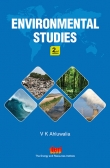Ecological Meltdown : Impact of unchecked human growth on the earth’s natural systems (Second Edition)
Book Details
In the second edition of Ecological Meltdown: impact of unchecked human growth on the earth’s natural systems, the authors discuss the destruction of biodiversity and ecosystems due to human actions. Apart from warning about the impending ecological meltdown and analysing the causes behind it, the book deals with the solutions that need to be urgently adopted by the global civil society and national governments.
The book is an invaluable resource for policymakers and institutions in the forestry, wildlife, energy, rural development, and environment sectors. It will also prove beneficial for conservationists, scientists, researchers, and students of environmental science. A new chapter on “Time for energy transition” has been added in this edition.
Target Audience
-
Policy-makers, Institutions, Conservationists, Scientists, Researchers, and students of Environmental Science
Table of Contents
- Need vs greed
- The eco-meltdown
- Gone forever
- A distant dream
- Danger ahead
- References
- Bibliography
- Annexure
- Understanding extinction
- Population matters
- Dilemma of the earth’s carrying capacity
- Population impact
- A matter of concern
- Misadventure millennium II
- Correlation between population dynamics, income (loss or gain) and biodiversity
- Shadows of coming events
- Vulnerability of coastal areas
- References
- Bibliography
- Barriers broken
- Forests in peril
- Economic growth at the expense of natural ecosystems
- Bleeding forests
- References
- Limitless energy in nature – sun, wind, water, and biomass
- Emergence of non-wood biomass fuel
- Biogas
- Limited in nature – coal, natural gas, and oil
- Postponing energy apocalypse
- Paradigm shift – an inevitability
- Bottlenecks to sustainability
- Back to basics
- References
- Hard and soft PAs
- Paper parks and green islands
- Size matters
- References
- Historical legacy
- Dilemma of managing wildlife trade
- Enhanced vulnerability to human predation
- From subsistence to organized crime
- Urgent reforms needed
- References
- Trends in financial resources for ecological conservation
- Failed commitments of Rio summit
- The flip side: trends in expenditure on destruction
- Ecological impact of increasing warfare and civil conflicts
- Reality bites
- Impact of economic depression on the ecological crisis
- References
- First and second generation conventions
- Biodiversity-related conventions
- The efficacy of conventions and environmental agreements
- References
- Averting biodiversity crisis – bridging the gap between science and policy
- Time for bold steps
- Small changes will make big difference
- Annexure
- Criteria and indicators for the conservation and sustainable management of temperate and boreal forests
- References
1. Beyond Limits
2. The Fast Breeding Machines
3. One Earth, Many Worlds
4. Time for Energy Transition
5. The (Un) Protected Areas
6. Victims of Human Hunger
7. Treating Deep Wounds – Is First Aid Enough?
8. The Relevance of Multilateral Environmental Agreements
9. Revisiting Sustainable Development
Keywords
You may also like...
-
 Environmental Studies (Second Edition)
Regular Price 325.00
Special Price 293.00
Environmental Studies (Second Edition)
Regular Price 325.00
Special Price 293.00
-
 The Land of the Setting Sun & Other Nature Tales
Regular Price 250.00
Special Price 225.00
The Land of the Setting Sun & Other Nature Tales
Regular Price 250.00
Special Price 225.00
-
 Innovation for Sustainable Development
Regular Price 655.00
Special Price 590.00
Innovation for Sustainable Development
Regular Price 655.00
Special Price 590.00


